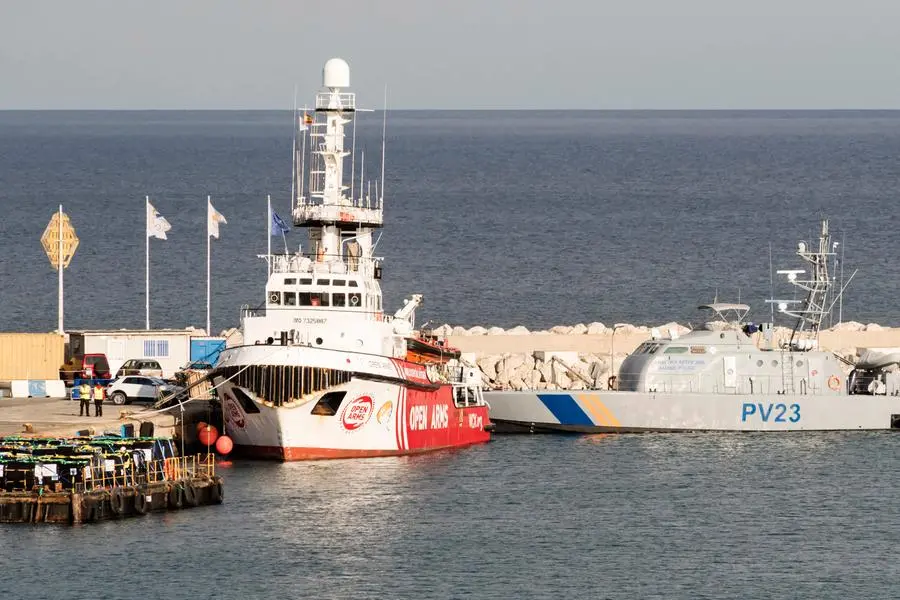PHOTO
A boat laden with food for Palestinians in war-ravaged Gaza was "ready" to set sail from Cyprus, an NGO said, as fighting raged between Israeli troops and Hamas militants ahead of Ramadan.
The sea route aims to counter aid access restrictions, which humanitarians and foreign governments have blamed on Israel, more than five months into the war which has left Gaza's 2.4 million people struggling to survive.
Hopes were fading fast for a pause in the fighting before Ramadan, which could begin as early as Sunday depending on the lunar calendar, as Israel accused Hamas of seeking to "inflame" the region during the Muslim fasting month.
US President Joe Biden said Israeli leader Benjamin Netanyahu's approach to the war was "hurting Israel more than helping Israel", during an interview with MSNBC broadcast Saturday.
Netanyahu "has a right to defend Israel, a right to continue to pursue Hamas," Biden said, but added that "he must pay more attention to the innocent lives being lost as a consequence of the actions taken".
The United Nations has repeatedly warned of looming famine, particularly in north Gaza where no overland border crossings are open.
In Rafah, in Gaza's far south, "we can barely get water," said displaced Palestinian woman Nasreen Abu Yussef.
Roughly 1.5 million Palestinians have sought refuge in the city, where Atallah al-Satel said he wanted an end to the war.
"We are just exhausted citizens," said Satel, who had fled to Rafah from Khan Yunis.
Spanish charity Open Arms said its boat, which docked three weeks ago in Cyprus's Larnaca port, was "ready" to embark but awaits final authorisation.
It would be the first shipment along a maritime corridor from Cyprus -- the closest European Union country to Gaza -- that the EU Commission hopes will open on Sunday.
Open Arms spokeswoman Laura Lanuza told AFP that Israeli authorities were inspecting the cargo of "200 tonnes of basic foodstuffs, rice and flour, cans of tuna".
US charity World Central Kitchen, which has partnered with Open Arms, has teams in the besieged Gaza Strip who were "constructing a dock" to unload the shipment, Lanuza said.
Meanwhile, the US Central Command said a US Army ship left Joint Base Langley-Eustis in Virginia on Saturday carrying the "first equipment to establish a temporary pier" to receive aid off Gaza.
The Pentagon said Friday it would take up to 60 days to set up the temporary pier, which Biden announced the previous night.
With ground access limited, countries have also turned to airdropping aid, although a parachute malfunction turned one delivery deadly on Friday.
- 'Only part of the solution' -
The health ministry in Hamas-run Gaza said Saturday the number of deaths in Israel's bombardment and ground offensive in Gaza had risen to 30,960, including 82 people killed in strikes over the previous day.
At least 23 children had died from malnutrition and dehydration, according to the ministry.
Israel's campaign to destroy Hamas began after the movement's October 7 attack on Israel resulted in about 1,160 deaths, mostly civilians, according to Israeli official figures.
The Israeli army said another of its soldiers had died in Gaza, taking its overall losses to 248 since the start of ground operations.
The UN's World Food Programme has warned that the volume of aid that can be delivered by sea will do little if anything to stave off famine in Gaza.
European Commission chief Ursula von der Leyen, in Larnaca on Friday, said a "pilot operation" would be launched in partnership with World Central Kitchen, supported by aid from the United Arab Emirates.
The US effort for a "temporary pier" off Gaza builds upon the maritime corridor proposed by Cyprus, senior US officials said.
Humanitarian workers and UN officials say easing the entry of trucks to Gaza would be more effective than aid airdrops or maritime shipments.
The US military said it airdropped more than 41,000 meals into Gaza on Saturday, and Canada has said it too will join aerial aid delivery missions.
But a steady flow of relief into Gaza was "only part of the solution", said International Committee of the Red Cross chief Mirjana Spoljaric.
The warring sides must do more to "safeguard civilian life and human dignity", she said, decrying the "unacceptable" civilian death toll.
- 'Tough' truce talks -
In their October attack, Gaza militants took about 250 Israeli and foreign hostages, some of whom were released during a week-long truce in November. Israel believes 99 hostages remain alive in Gaza and that 31 have died.
After a week of talks with mediators in Cairo failed to produce a breakthrough, Hamas's armed wing said it would not agree to a hostage-prisoner exchange unless Israeli forces withdraw.
Israel has rejected such a demand.
On Saturday, Netanyahu's office said Mossad spy agency chief David Barnea had met CIA director William Burns on Friday "as part of the ceaseless efforts to advance another hostage release deal".
Biden has acknowledged it would now be "tough" to secure a new truce deal in time for Ramadan.
Saturday's Israeli statement accused Hamas of "entrenching its positions like someone who is not interested in a deal and is striving to inflame the region during Ramadan".
Israeli military spokesman Daniel Hagari said Israel was preparing for "all possible operational scenarios" during the Muslim holy month.
On the ground in southern Gaza, the Israeli army said fighting persisted in the area of Khan Yunis. Hamas authorities reported Saturday more than 30 air strikes overnight.
Hamas chief Ismail Haniyeh called for the speedy distribution of aid to Gazans and for the full opening of border crossings "to end the siege of our people".
The war's effects have been felt across the region, including off Yemen, where the US military said it and allied forces shot down 28 one-way attack drones fired by Iran-backed Huthi rebels towards the Red Sea and Gulf of Aden on Saturday.





















